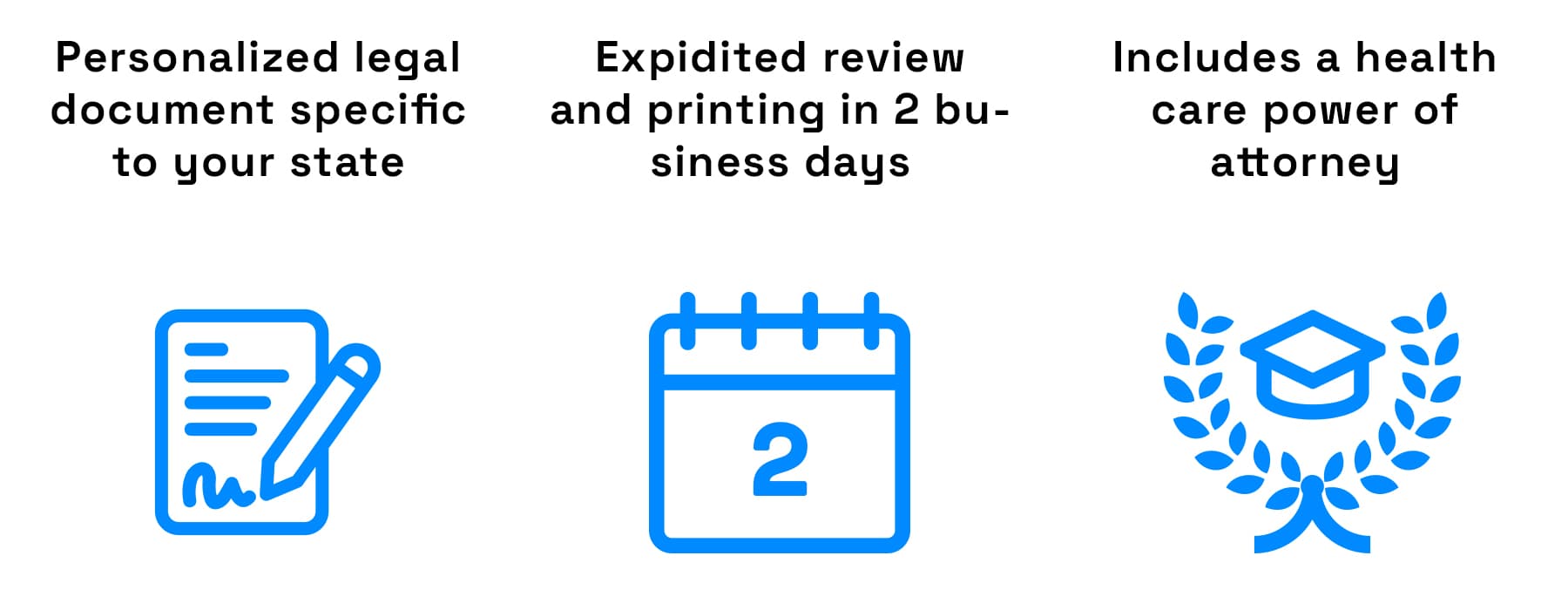To speak with an attorney or ask a question please complete the information below.
9777 Wilshire Blvd. #400, Beverly Hills, CA 90210
beverly-hills@citadel.law424-239-6433

Are you or a loved one facing a terminal illness? Use this guide to learn how you can make the grieving process easier with advanced care planning.
What Is Advance Care Planning?
If you are extremely sick or unable to express your intentions for your future medical treatment, it's important to plan ahead by creating an advanced medical directive. The most crucial aspect of creating this directive is having heartfelt discussions with loved ones. You and your loved ones will discuss your end-of-life care plans and the types of medical treatment you are willing to receive as well as the ones you don't want.
What Are Advance Directives?
You can use an advanced medical directive to legally codify your advanced care requests. These directives generally come in two primary types:
-
Living will form: A living will expresses your healthcare preferences in the event that you are unable to speak for yourself during a medical emergency. You can indicate in a living will the types of routine medical care you desire, the types you don't want and the circumstances in which you want each.
-
Power of attorney for healthcare: You can designate a healthcare proxy as a power of attorney for healthcare; this person can legally speak on your behalf if you become unable to do so. Whoever you choose to act as your proxy should know and understand your medical priorities and preferences. One of the best ways to prepare for the unexpected, such as a catastrophic automobile accident or a stroke, is to appoint a healthcare proxy.

Who Needs an Advanced Care Plan?
People of any age or health status can benefit from an advance healthcare directive. A medical emergency can happen to anybody, at any age, and leave them unable to express their wishes for their treatment. If you take the time to plan ahead, you can have confidence knowing that someone you trust will help carry out your wishes for future medical care.
If you don't name an agent to make medical choices on your behalf, some states have laws in place to protect you. Some laws mandate that everyone have a "priority listing" of people who can make choices on their behalf if they become incapacitated. You should encourage your children to create their own advance healthcare directive form when they turn 18.
Some people mistake advance care planning as only beneficial for the elderly. However, in the event of a catastrophic injury, terminal illness, coma or imminent death, advance directives provide a roadmap for medical professionals to follow. The fact that more than a third of Americans have created advance directives demonstrates their significance.
Communicate your preferences to your physicians and provide them with all the information and records they need to maintain an open line of communication. This is crucial when dealing with a life-threatening condition.
It's possible that your physician uses the term "advance care planning" when having conversations with you and your loved ones about a medical diagnosis and the treatment options. By discussing in detail your advance healthcare wishes, you'll give your doctor a greater chance to get to know you and include you as a partner in your care.
More control over your health care and peace of mind for you and your loved ones are additional benefits of an advanced directive. You'll receive the finest and most effective care when everyone works together.
When deciding on a course of treatment, many individuals consult with loved ones, friends, medical professionals and even religious leaders. You should always consider the medical treatment a friend or loved one experienced during a terminal illness or emergency and request that you receive those same aspects of care.
You have full control over the people involved in your emergency and end-of-life care when you create an advance healthcare directive. Of course, your physicians and any proxies you've designated will play a role. You'll also want to include loved ones and any other key individuals in your life that you want to know about your wishes for end-of-life care.
For those with dementia, advance care planning offers a feeling of empowerment as they face an uncertain future. It also allows them to have a voice in their future medical treatment.
If you are the caretaker of someone with dementia, you should push for advance care planning conversations. When making choices about your loved one's care and treatment in the latter stages of dementia, you may find it helpful to talk things over with other family members, the person's healthcare practitioner or a trusted friend.
What Happens If You Do Not Have an Advance Directive?
If you can't make medical decisions and you don't sign an advance directive or living will form, the state you live in will decide who can make healthcare choices for you.
For married people, states usually delegate healthcare choices to the spouse. If your spouse is unable to make medical decisions for you, states typically give your parents or any adult children the right to make your medical choices. If you are not married but reside with a romantic partner, it's especially important to take part in advance care planning. Without legally designating a partner as a proxy, this person can't make medical choices on your behalf.
Some states will allow a close friend to make medical choices for you in the event you need to make them and are unable to communicate; this close friend may or may not be a partner you reside with.
When you don't have an advance directive and the state doesn't designate any family member or friend as your proxy, a physician will usually take control of your medical choices. To learn more about the laws in your state, it's helpful to contact experienced living will attorneys.

Advance directives are legal but not binding. Your physicians and any proxies will try their best to fulfill your advance instructions, but in some instances, it may not always be possible.
A doctor may ignore your advance instructions when he or she believes your instructions violate:
-
Medical ethics
-
Hospital policies
-
Medical standards
Advance directives are routinely neglected for many reasons. However, the sooner you create and sign one, the sooner you can have peace of mind knowing your loved ones are aware of your future healthcare wishes.
You should never consider an advance directive unnecessary. Many people don't create one because they fear death or major sickness. Others consider the process a burden to others, but in all actuality, it can be even more burdensome to your loved ones if you don't create one.
Another reason people often forego creating and advanced directive is that they don't understand their healthcare options. Some also have a difficult time filling out the required forms, which is why it's helpful to consult experienced living will attorneys when creating an advanced care directive.
Other Advance Care Planning Forms and Orders
In addition to an advance directive, you can create other forms of paperwork to establish your medical wishes and who is in control of them.
Other forms to consider during advance care planning include:
-
DNR: DNR stands for do not resuscitate. Without a signed DNR form, medical personnel must make all reasonable efforts to revive you in a life or death medical emergency. A DNR order is useful in your medical file at a hospital, even if your living will states that you do not want the administration of CPR.
-
DNH: DNH stands for do not hospitalize. With a DNH on file, long-term care personnel know to send you home for end-of-life treatment instead of hospitalizing you.
-
DNI: DNI stands for do not intubate. This document lets medical personnel know that you refuse a ventilator as a form of medical treatment.
-
Out-of-hospital DNR: This order notifies emergency responders of your desire for CPR and other life-sustaining procedures.
-
POLST and MOLST: POLST stands for physician orders for life-sustaining treatment. MOLST stands for medical orders for life-sustaining treatment. Both of these documents provide health care professionals with details regarding your medical treatment preferences during emergencies. The forms often supplement advance directives.

How Can We Help You Get Started With Pre-care Planning?
The Citadel Law Firm helps clients with advanced care planning. Use the tips outlined below to get started with your long-term pre-care planning.
Think About Your Personal Preferences
Consider your personal goals and aspirations. Considerations like these can help you make informed choices regarding your end-of-life care and treatment.
Speak With Your Insurance
Medicare will pay for a wellness checkup that includes advance care planning. Contact your insurance company if you have private medical coverage to see if you have this type of coverage.
Talk It Over With Your Doctors
Understand your present health situation and the treatment options you may face in the future by consulting with your doctors. For example, if you have high blood pressure, you'll want to discuss the likelihood of a stroke and your treatment options to determine which options you prefer to include in the advance directive.
Choose a Reliable Person to Make Medical Choices for You
Always choose someone you trust to act as your proxy. Talk to them about your basic preferences if you're not ready to discuss particular treatments or care options just yet. Make sure this person is reliable because he or she will be in control of your medical care during end-of-life situations.

Properly Fill Out All Forms
Have an attorney with experience in creating advanced directives review or fill out the paperwork for you. Hiring an experienced attorney is important because this person understands the differences between advanced care directives, living wills and living trusts and knows how to fill out the necessary paperwork to ensure your advanced directive is legal.
Send the Forms to the Appropriate Entities
Make sure you have copies of your advance directives stashed somewhere when you've finished writing them. Distribute duplicates to your proxy, doctors, the medical facilities you regularly visit and your attorney. Depending on the state you reside in, you may be able to store your directive in a state registry, making it easy for medical professionals to reference your wishes during end-of-life and emergency situations.
Update the Forms Regularly
Keep reviewing your documents and discussing your desires annually or whenever there is a significant change in your life. Remember to file and maintain older copies of forms, even if you decide to change them. When sending updated copies to your proxy, attorney and healthcare providers, take a look at the date to ensure you send the most up-to-date one.
Contact Citadel Law Corporation today at (800) 662-0882 and speak with estate planing lawyer in order to get started on creating these legal documents.
We are here to answer all of your legal questions!
Our attorneys are waiting to help you

